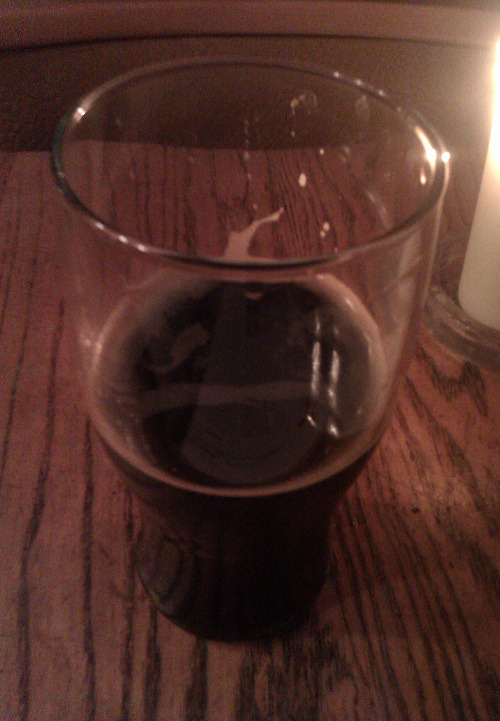Here we are then, the first beer on our arduous journey, and I’ve purposefully started with an absolute stonker.
To my surprise, I’ve also started with one that isn’t even in the book! We’ll deal with that minor technicality in due course.
I first came across Old Freddy Walker quite recently at the magnificent Westow House in Crystal Palace, London. They regularly stock offerings from Somerset’s Moor Beer, and they’re always top-notch. The sublimely decadent and sadly – but necessarily – very rare Sloe Walker is a particularly memorable example.
On learning the price, my jaw hit the floor quicker than Luis Suarez after a gentle brush with a defender, but the beer was poured, and I was thirsty from the climb up the hill to SE19.
One sip was all that was needed to realise that, unlike the Uruguayan thesp, this was worth every penny, and that I would be back for more as soon as 300 Beers was underway.

The beer has a smallish coffee head that dissipates quickly. There’s surprisingly little on the nose, though I did detect an exotic whiff of Shaoxing rice wine. The mouthfeel is thick, silky and unctuous and there’s no doubt that we’re dealing with something a bit special.
The hefty alcohol content, whilst thankfully not hidden behind excessive sweetness, isn’t intrusive, but there’s just enough booziness there to remind you that this is a pint to be savoured slowly. Overall this is deep, rich and complex, both malty and hoppy in spades, and one for real beer lovers.
Apart from the price, the other big surprise was how much I found myself enjoying a keg beer. The cask versus keg debate has been done to death, but as I’m kind of old fashioned I’d always associated cask with genuinely good beer, and keg with bland, mass-produced lager.
A blog post from Pete Brown had recently got me questioning that assumption. Pete suggests that “the best method of dispense becomes a function of recipe and ABV”, with cask being more suitable for weaker, more subtly-flavoured English-style beers such as an Ordinary or a Best bitter, while keg is more suited to stronger, heavier, darker brews.
Weighing in at 7.3% ABV and blacker than the All Blacks’ favourite liquorice during a power cut, Old Freddy Walker certainly falls into the latter camp, and on this evidence I think Pete may just be on to something.
This is a five-stars-out-of-five beer, and the next 300 will have their work cut out following Old Freddy.
Which is why I’ve started here. Well, also because I took Moor Beer at their word and wrote this post before actually reading the book. It isn’t in there, but I can only assume it was in an earlier edition.
Either way, I think this is a suitable benchmark against which subsequent beers can be compared. If I find even one beer that matches Old Freddy on this journey, it’ll be worthwhile.
Facts and Figures

